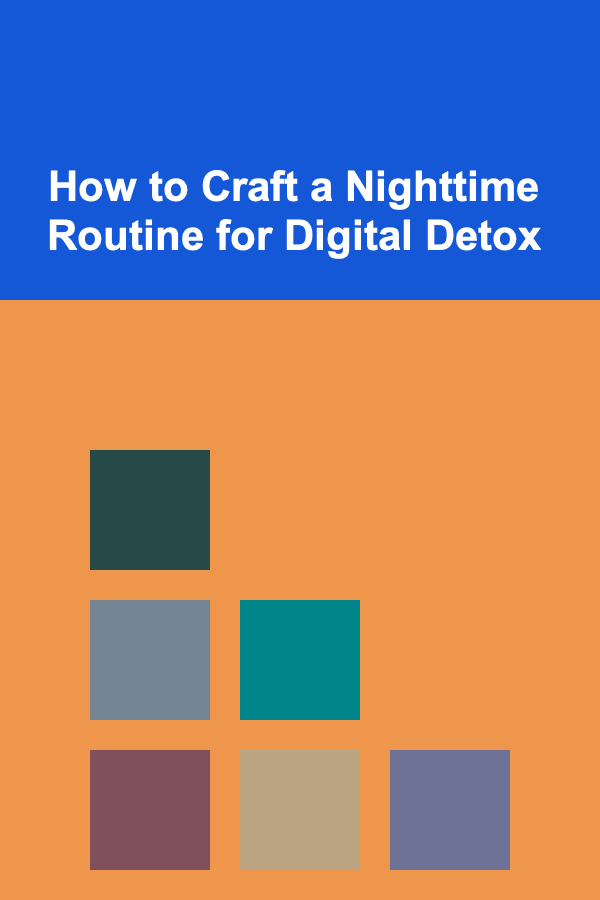
How to Craft a Nighttime Routine for Digital Detox
ebook include PDF & Audio bundle (Micro Guide)
$12.99$7.99
Limited Time Offer! Order within the next:

In today's hyper-connected world, we spend a significant portion of our day interacting with screens---whether it's for work, entertainment, or socializing. While technology has made life easier and more efficient, it has also led to new challenges, particularly when it comes to mental health and sleep quality. The constant barrage of notifications, blue light exposure, and the habit of mindlessly scrolling through social media can affect our well-being in profound ways.
One of the most effective ways to combat the negative impacts of digital overload is by creating a digital detox nighttime routine. A digital detox refers to the intentional removal or reduction of screen time to allow your mind and body to reset and unwind. By crafting a digital-free evening routine, you can enhance your mental clarity, improve the quality of your sleep, and experience a more peaceful transition from day to night.
In this article, we'll explore the steps you can take to build a nighttime routine that helps you detox from screens. This routine will focus on holistic relaxation techniques, healthy habits, and mindful practices that will support your overall well-being and give your mind the break it needs after a long day of digital engagement.
Understanding the Need for a Digital Detox at Night
Before diving into the practicalities of creating a digital detox nighttime routine, it's important to understand why such a practice is so beneficial. The modern lifestyle, especially with the rise of remote work and constant access to digital devices, makes it difficult to disconnect from technology. Many people find themselves checking emails, social media, or the news right before bed, which can have a number of adverse effects:
1. Disrupted Sleep Patterns
One of the most common consequences of excessive screen time at night is poor sleep. The blue light emitted by smartphones, tablets, and computers can suppress melatonin production, a hormone that regulates sleep. This disruption can make it harder to fall asleep, leading to reduced sleep quality and an overall negative impact on your physical and mental health.
2. Increased Stress and Anxiety
Digital interactions, particularly social media, can trigger feelings of stress, anxiety, and even FOMO (fear of missing out). Constantly checking notifications, scrolling through news feeds, or comparing yourself to others can increase feelings of inadequacy or frustration. This mental stimulation can make it difficult to unwind and relax before bed.
3. Reduced Cognitive Functioning
Engaging with screens late at night can negatively affect cognitive function. Research has shown that excessive screen time can lead to a reduction in memory, attention, and focus. Inadequate sleep and high mental stimulation can leave you feeling mentally foggy the next day.
4. Decreased Mindfulness and Presence
With technology at our fingertips, it's easy to become distracted, constantly checking messages or emails. This habitual checking can take away from the present moment, diminishing our ability to unwind and be mindful.
Creating a digital detox nighttime routine can mitigate these effects, promoting relaxation, improving sleep, and supporting your mental health.
Step 1: Set Clear Boundaries for Screen Time
The first step in a digital detox is setting clear boundaries for screen time. Having a designated cutoff time for all digital devices---phones, computers, tablets, and TVs---helps create a healthy routine for winding down.
1. Create a 'No Screens' Policy After a Certain Hour
Choose a specific time in the evening, ideally about an hour or two before bed, to stop using screens. For example, if you plan to go to sleep at 10:30 PM, aim to turn off all screens by 9:30 PM. This will allow your brain to detach from the digital world and begin transitioning into a more restful state.
2. Use 'Do Not Disturb' Mode
During your wind-down time, set your phone to 'Do Not Disturb' or 'Airplane Mode' to avoid interruptions. Notifications, texts, and calls can disrupt your ability to unwind and create unnecessary mental clutter.
3. Set Up Screen-Free Zones
Designate areas in your home where screens are not allowed, such as the bedroom or the dining room. This ensures that you have a space where you can fully disconnect and focus on rest or other non-digital activities.
Step 2: Establish a Relaxing Pre-Bedtime Routine
Once you've set your digital boundaries, it's time to create a relaxing routine that doesn't involve screens. A calming pre-bedtime routine will prepare both your body and mind for restful sleep, helping to signal to your brain that it's time to unwind.
1. Practice Deep Breathing or Meditation
Incorporating deep breathing exercises or meditation into your nighttime routine can significantly reduce stress and promote relaxation. Techniques such as the 4-7-8 breathing method, progressive muscle relaxation, or mindfulness meditation can help calm your nervous system and clear your mind of any lingering thoughts from the day.
2. Take a Warm Bath or Shower
A warm bath or shower not only promotes relaxation but also helps regulate your body temperature, which is crucial for sleep. Studies show that a drop in body temperature after a warm bath signals to the brain that it's time to sleep.
3. Incorporate Gentle Yoga or Stretching
Doing some light yoga or gentle stretching before bed can relieve muscle tension and promote better circulation. Focus on slow, deep movements that help release any stress or tightness from the day.
4. Aromatherapy and Relaxing Scents
Using essential oils such as lavender, chamomile, or sandalwood can help create a calming environment. Aromatherapy has been shown to reduce stress, improve sleep quality, and promote relaxation. You can use a diffuser, apply oils to your skin (diluted in a carrier oil), or add them to your bath.
Step 3: Engage in Non-Digital Activities
To ensure a true digital detox, replace screen-based activities with non-digital, enriching activities that foster connection, relaxation, and creativity.
1. Read a Book
Reading a physical book or listening to an audiobook can provide the perfect mental escape before bed. Avoid reading on digital devices, as the blue light from screens can interfere with your sleep. Choose light, enjoyable reading material to help you unwind.
2. Journaling
Writing in a journal before bed is a wonderful way to process thoughts and emotions. Journaling can help declutter your mind, release any lingering stress, and promote mindfulness. You can write about your day, reflect on what you're grateful for, or plan for the next day.
3. Listen to Music or Podcasts
Music and podcasts are great ways to wind down and create a relaxing atmosphere. Choose calming, instrumental music or a soothing podcast that doesn't overstimulate your mind.
4. Do Creative Activities
Engage in creative hobbies such as drawing, knitting, or crafting. These activities not only help you disconnect from screens but also promote mindfulness and relaxation.
Step 4: Create a Sleep-Inducing Environment
Your sleep environment plays a significant role in your ability to unwind and fall asleep. Creating a peaceful, screen-free environment that supports your nighttime routine is key to your digital detox.
1. Dim the Lights
About an hour before bed, begin dimming the lights in your home to signal to your body that it's time to prepare for sleep. Harsh, bright lights can interfere with the production of melatonin, the hormone that regulates your sleep-wake cycle.
2. Keep the Room Cool
The ideal temperature for sleep is between 60-67°F (15-19°C). Keeping your bedroom cool helps your body maintain the optimal temperature for deep sleep. If necessary, use a fan or open a window to regulate the room temperature.
3. Make Your Bed Comfortable
Ensure your bed is comfortable and conducive to a good night's sleep. Invest in a high-quality mattress, pillows, and soft bedding that suit your personal preferences.
4. Limit Noise and Distractions
To promote deep sleep, reduce any external noise or distractions in your environment. You can use earplugs, a white noise machine, or calming soundtracks to mask any disruptive sounds.
Step 5: Commit to Consistency
A digital detox nighttime routine works best when it's consistent. Try to follow your routine every night to establish healthy sleep patterns and habits. The more regularly you engage in your routine, the more effective it will be in helping you unwind and relax.
1. Stick to a Set Bedtime
Having a regular bedtime helps reinforce your body's natural sleep cycle. Try to go to bed and wake up at the same time every day, even on weekends, to maintain consistency.
2. Avoid Napping Late in the Day
Late-afternoon naps can interfere with your ability to fall asleep at night. If you do need to nap, try to keep it short (20-30 minutes) and earlier in the day.
3. Track Your Progress
Keep track of how you're feeling after implementing your digital detox routine. Are you sleeping better? Are you feeling more relaxed at bedtime? Reflect on your experiences and make adjustments as needed to optimize your routine.
Conclusion
Crafting a digital detox nighttime routine is a powerful way to improve your sleep quality, reduce stress, and enhance your overall well-being. By setting clear boundaries for screen time, incorporating relaxing pre-bedtime activities, and creating a peaceful sleep environment, you can effectively detach from the digital world and allow your mind and body to recharge. Consistency is key, so make your routine a non-negotiable part of your evening. Over time, you'll notice the positive impacts on your mental health, productivity, and overall quality of life.
Reading More From Our Other Websites
- [Home Soundproofing 101] How to Soundproof a Hollow Core Door: Budget-Friendly Methods for Noise Control
- [Home Budget Decorating 101] How to Transform Your Kitchen with Budget-Friendly Updates
- [Personal Financial Planning 101] How to Invest in Real Estate on a Budget
- [Home Holiday Decoration 101] How to Create a Farmhouse Christmas Decor Using Recycled Materials
- [Rock Climbing Tip 101] Mastering the Art of Safe Falling: Essential Techniques for Everyone
- [Trail Running Tip 101] Conquering the Peaks: How to Prepare for a 50-Mile Trail Running Challenge
- [Home Rental Property 101] How to Improve Tenant Retention in Your Rental Property
- [Home Pet Care 101] How to Offer Basic Dog Care at Home for Senior Canines: Gentle Grooming and Comfort Strategies
- [Personal Finance Management 101] How to Decide Between Home Ownership and Renting
- [Home Lighting 101] How to Use Task Lighting to Improve Productivity in Your Home Office

How to Set Up a Hot Cocoa Station for Your Holiday Guests
Read More
How to Use Clear Bins for Effective Closet Organization
Read More
Smart Strategies for Planning Shopping Trips to Avoid Impulse Buying
Read More
How To Understand the Role of Fear in Extreme Sports
Read More
How to Aquascape with Moss: A Step-by-Step Tutorial
Read More
10 Tips for Crafting Meditation Scripts for Beginners
Read MoreOther Products

How to Set Up a Hot Cocoa Station for Your Holiday Guests
Read More
How to Use Clear Bins for Effective Closet Organization
Read More
Smart Strategies for Planning Shopping Trips to Avoid Impulse Buying
Read More
How To Understand the Role of Fear in Extreme Sports
Read More
How to Aquascape with Moss: A Step-by-Step Tutorial
Read More